by Scott Jared, The Well, Tuesday, May 12th, 2020
Carolina music professor Jim Ketch talks teaching, performing and basketball as he nears retirement.
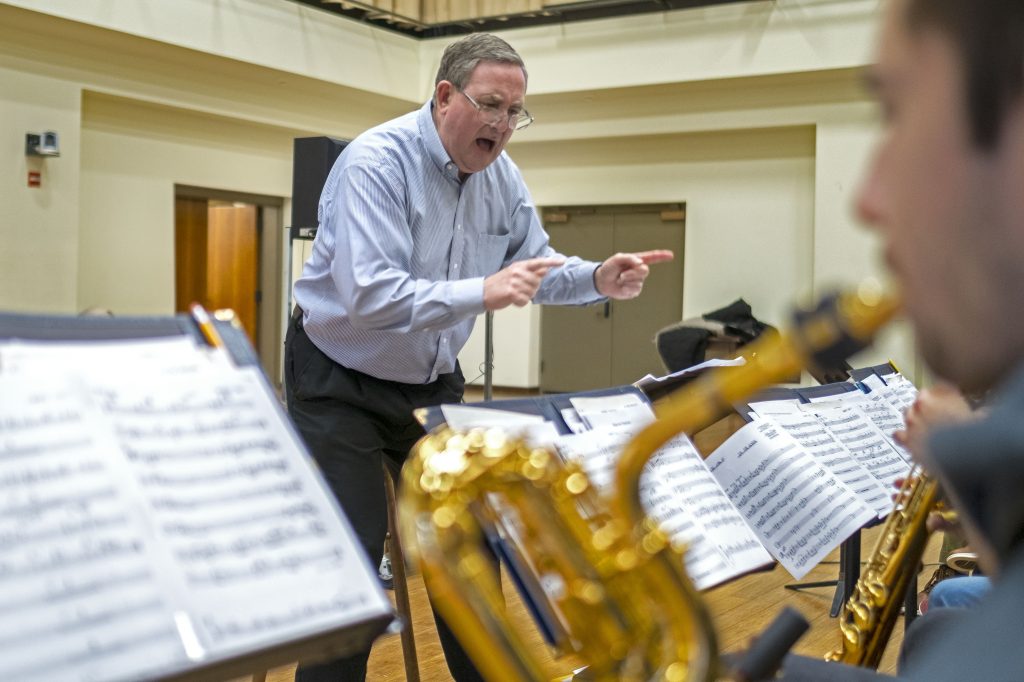
“Life is like a trumpet. If you don’t put anything into it,
you don’t get anything out.” ─ W.C. Handy
For Jim Ketch, life and trumpet are one and the same and, boy, has he put a lot into each.
Ketch, a music professor and director of jazz studies who will retire July 1, has combined teaching, performing and bringing talented high school students to campus in his 43 years at the University. The four-time teaching award winner and former chair of the music department may be best known as founder of the Carolina Jazz Festival, still going strong since 1977.
Because of Ketch’s career of significant influence on and service to North Carolina, Gov. Roy Cooper recently conferred the music professor as a member of The Order of the Long Leaf Pine.
At the passionate heart of that career: playing and teaching the trumpet.
Teaching, trusting, supporting
Renee McGee, a senior trumpet major, is a beneficiary of Ketch’s approach to teaching and mentoring students. She played in the jazz program and studied privately with Ketch for four years. As a high school senior, she met Ketch while interviewing for a spot in Carolina’s music program. On his advice, she applied for and was awarded a Kenan Music Scholarship that pays tuition, room and board.
During her first semester, she landed a spot in the UNC Jazz Band but was considering dropping her chemistry major. She talked with Ketch, who showed up at her next lesson with a three-page document that bolstered her confidence.
“It was a mock résumé titled ‘Renee McGee, Trumpet Professor,’” McGee says. “It listed my strengths, and he had added all the skills that he wanted to teach me. It’s sort of a plan toward professorship. I still have that document, and it’s guided many of my choices.”
Ketch’s mentoring has influenced thousands of other students, such as John Parker ’14, associate principal trumpet with the Houston Symphony Orchestra. Parker also played for Ketch as a high school senior and quickly saw how knowledgeable and supportive Ketch was. Parker also auditioned for and earned a scholarship at Ketch’s behest, then played in UNC’s Jazz Ensemble for four years and in other University groups.
Ketch trusts his students, Parker remembers, to be responsible for working outside of rehearsals. “If we failed to do the work, he had a way of picking us up,” Parker says. “That’s a large part of why he’s such a great educator. Such a good balance between encouragement and tough love.”
“Whether in practice or performing, I’m always reminding myself of things he says, like thinking as a vocalist when I play and having a vocal quality with vowels,” Parker says. “I can definitely hear a little Ketch voice in my head.”
‘Strap on your seat belts’
A day after a show at North Carolina Central University, Ketch arrives early in the Kenan Music Building rehearsal hall to set out notes and sheet music on the Jazz Band stands. He compliments the group on its performance, then moves quickly to four tunes.
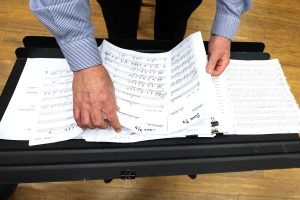
After playing Steve Wilson’s “The Epicurean” from his laptop, Ketch readies the students to play, saying “Strap on your seat belts, and let’s do it.” And away they go, with Ketch bouncing on his white New Balances, shooting his hands into the air and peering over glasses perched at the end of his nose.
The students nail it, and Ketch uses the first of the session’s many sports analogies: their effort is like a basketball team practicing hard the day after a tough game.
They move on to “Blues for Marcus.” Ketch stops and says it would benefit from a slower tempo. And, with a “One, two, ah, one, two, three, four,” Ketch starts them up again.
Again, he stops them. “I hear Julian and Toby,” he says, but the rest of the “trumpets and ’bones need to spank it a bit more. Let’s see if we can make the sum greater than the individuals.”
At one point, he moves a trombonist and trumpeter up front, then adds the upright bass player to help the ensemble tighten up. When some of the ensemble overpower the others’ sounds, Ketch alludes again to basketball. “It’s like a starting five with all point guards and no center,” he says, and, again, they understand exactly.
‘Something magical will happen’
When Ketch conducts, an energy possesses him as he moves side to side, punching down with one hand while punctuating a rising note with the other. The energy is on display in numerous YouTube videos, including his driving an ensemble through Jimmy Heath’s “Big P.”
McGee said that when her parents and grandparents attended her first UNC Jazz Band concert, they were amazed at Ketch’s energy.
“Traditionally, the drummer drives the band, and there’s not a director,” she says. “[Ketch] stands up there, and his energy inspires us. Energy begets energy, he says.”
If Ketch needs to make some notes clearer, he enthusiastically vocalizes notes in his own jazz language: “Bah de boo da, Dah dooby dah, Gotta bee budda bop, Bbah bah bow!” The students understand.
Underlying his energy are urgency and positivity, Ketch’s tried-and-true combination for an outcome he foresees when he tells the ensemble, “Play it, and maybe something magical will happen.”
How it began
The magic began in August 1977, during a one-year appointment at UNC-Chapel Hill following a summer stint teaching youth music at the University of Illinois. Ketch and his wife Susan rolled off Interstate 85 with U-Haul trailer in tow, down Highway 86 and into Chapel Hill.
“We noticed that there wasn’t anything except pine tree after pine tree. Nothing,” he said. “Just a little road that eventually led to this quaint little town, Chapel Hill.”
The year before, Ketch was on faculty at Southern Utah State College. His friend Jim Harrison, a Carolina alumnus, taught German there and spoke glowingly about the University’s faculty and his student days. So, Ketch felt some irony when Carolina offered him the one-year appointment.
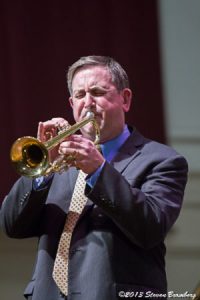
His introduction to the music department was an August recital called “Wednesdays at 4,” which served as a department convocation. Department chair James Pruett, who hired Ketch, told him that all new faculty performed at the recital. This was long before air conditioning came to Hill Hall auditorium, and Ketch played in front of 200 students and nearly 40 faculty.
“I think he just wanted to see this 25-year-old guy sweat a bit,” Ketch recalls. “To tell you truth, I did. It must have been 100-plus degrees. I was playing a solo, Henry Purcell’s ‘Sonata for Trumpet and Organ.’ I remember to this day the sweat just pouring down my face and me trying to keep the mouthpiece from sliding off my lips.”
‘Like something we shouldn’t pass up’
“My wife and I were young, and UNC was a much bigger school, so we thought, There’s probably more opportunity. It sounds like something we shouldn’t pass up, even if it’s for a year,” Ketch remembers.
That year led to another one-year contract before the University hired him permanently after a nationwide search. In the ensuing years, Carolina’s hold on Ketch strengthened in many ways.
He cites the beauty of campus as one. “I’ve been on hundreds of college campuses, and there may be some that rival ours, but I’ve never tired of driving on to campus, coming down Cameron Avenue and going by the Old Well.”
Excellent faculty have inspired him and allowed him to find joy in collaboration. “They have such passion for what they do, and that helped instill within me that I am representing trumpet and jazz, so I’m going to be just as evangelical as they are in pursuit of their craft. It was just such a great environment to learn and grow.”
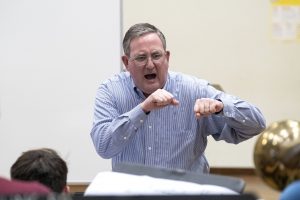
(Jon Gardiner/UNC-Chapel Hill)
And, students have consistently responded to his teaching, whether in a jazz history class of 200 students, 15 in an ensemble or one-on-one in the trumpet studio.
“That’s the joy of my job,” he says. “I had such diverse ways of interacting with students. What college student or professor gets much of that?”
‘A marvelous musician’
Ketch’s trumpet has taken him around the world and into the recording studio. Longtime friend, saxophonist and fellow jazz educator and NEA Jazz Master Jamey Aebersold calls Ketch “a marvelous musician” with vast expertise in theory and harmony. Ketch’s playing ranges from classical to big band to small-group jazz, and he bops with the best.
Among Ketch’s memorable performances, he points to some “really fun and significant concerts” in Memorial Hall with saxophonist Branford Marsalis, jazz guitarist John Pizzarelli and jazz vocalist Rene Marie. He played for a packed house at an all-Gershwin concert that recreated the 1924 Paul Whiteman Orchestra version of “Rhapsody in Blue.”
One particularly challenging piece in 1979 stands out. Carolina’s orchestra director David Serrins asked Ketch to play Bach’s “Brandenburg Concerto number 2 in F major.” “It’s a real tour de force for the trumpet and written in the highest of registers for the instrument,” Ketch notes. “I guess in my naiveté, I said ‘Well, I’ve never played it before, but I’ll give it a try.’” Ketch trained like a heavyweight boxer with months of practice that included running to increase his oxygen capacity.
“I probably was never in better physical shape, and the performance came off well. I probably would have never played that at another school. I enjoyed that opportunity a lot.”
He’s also played with and educated musicians of all ages. He’s performed with the North Carolina Symphony Orchestra, the Mallarme Chamber Players, the Crown Chamber Brass, the Triangle Brass Band and pit orchestras for touring Broadway shows. Ketch has appeared with a long list of popular artists such as The Temptations, The Four Tops, Natalie Cole, The Manhattan Transfer, Aretha Franklin and jazz piano master Marcus Roberts.
And the local community has heard Ketch play often with fellow faculty members. Many count among their favorites his performance of “There Will Never be Another You”with five students at Coach Dean Smith’s memorial service in the Smith Center.
Jazz Festival ‘a no-brainer’
Teaching, performing and relationship-building all came together at the Carolina Jazz Festival. Ketch wanted to introduce students to the high level of professional musicians, so he cobbled together the first festival with support from the department and an instrument company.
Knowing that certain life experiences are meaningful at different ages, Ketch thought about his first year in college when he played with ebullient jazz trumpeter Clark Terry at a festival.
“His playing, his personality, his stage persona, the authority of his persona. He was doing it right, and I thought, I’d like to be like this guy,” Ketch remembers. “When I got to UNC, it was sort of a no-brainer to start a festival.”
As the festival grew, it became a time for students to showcase their skills and play with professionals such as guitarist Dave Stryker and saxophonist Steve Wilson. The festival and Carolina’s Summer Jazz Workshop have enticed high school musicians and directors to visit campus and helped build one of the country’s best jazz programs.
‘The program’s still great’
“We have a jazz program,” Ketch says. “I think Coach K says it best. He says, ‘It’s not the team, it’s the program. The team might have an off year, but the program’s still great.’”
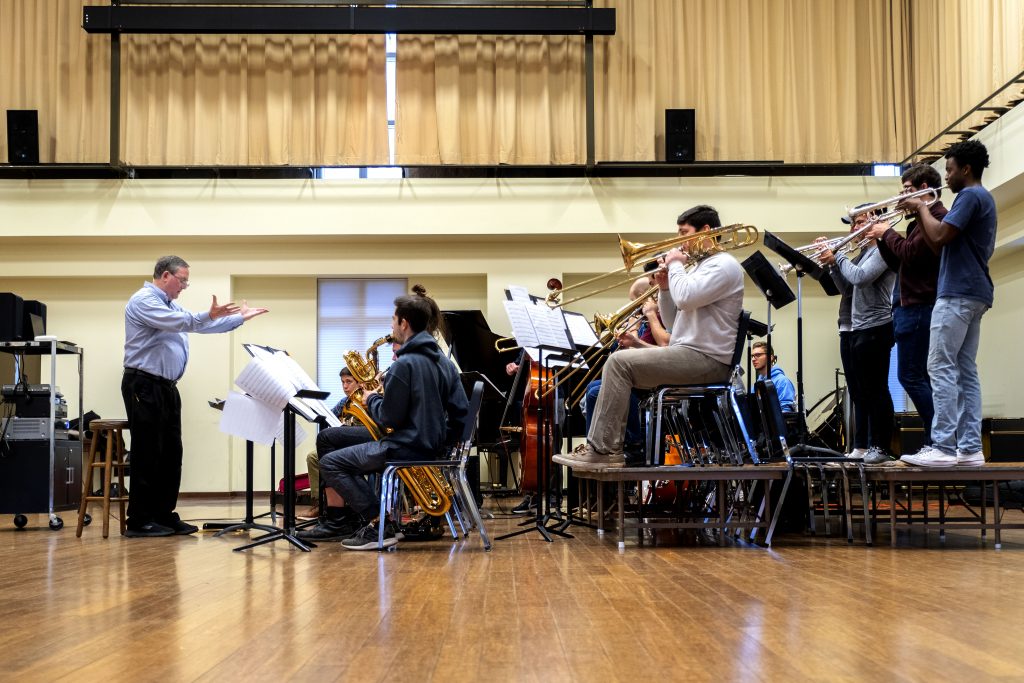
The 2020 Jazz Band, for example, is among the best, with “good players in every section, and even if some are freshmen, they just played beyond their years.
“I’ve had good bands throughout the 43 years I’ve been here, but for our current students, the jazz IQ continues to be higher. Students know more about improvisation, the history of the music,” he says. “They’re investing more time and listening to the music.”
Then, there’s basketball
Comparisons of basketball and jazz make sense. Practice, ensemble play and perhaps most pointedly, the solos of jazz equate to the improvisation of a fast-break or mid-shot adjustment.
Maybe that’s why Ketch loves basketball, but it began with his growing up in hoops-crazy Indiana. He ascended to a higher plane of infatuation after arriving on Tobacco Road.
“I thought I knew what basketball as a religion was until we moved down here,” Ketch says.
‘Moments that I’m proud of’
Ketch remembers orchestra concerts on campus after 9/11 and how important music became to America then. He remembers wind ensemble performances at installation ceremonies for new Carolina chancellors.
“Those were moments that I’m proud of,” Ketch says. “We’re playing in this incredible sort of parade, if you will, with our choir singing. Can you imagine those times without any music whatsoever?”
Ketch also remembers students like the young woman who, despite a shoulder injury that made it painful to hold a trumpet, took on challenging pieces of music.
“She developed a fearless quality and her perseverance made me think, Here’s somebody who may not be as talented as others, but she, more than all of them, made up for it with her tenacity.”
‘The most important thing … today’
His teaching philosophy, Ketch says, can be distilled to a simple statement. “It’s my job to make students care more about what they study than they normally would. If it means more to them, they will invest more time to listen to examples and practice.”
That’s why the rehearsal hour is sacred time for the professor and his students. Students sharing in that sentiment fuels his efforts, Ketch says.
Ketch wants them to find the worth and meaning in the music for themselves as a catalyst toward putting in their best efforts. “Make this hour the most important thing in your life today,” he says.
“When that occurred, and I must say it occurred on a day-to-day basis more often than not, we were in moments when I felt like, Wow! Everybody’s on the same page,” he says.
The students’ growth, Ketch says, starts with his passion, enthusiasm, preparation and ability to teach concepts, perhaps even picking up his horn and demonstrating a concept. That growth often leads to special concert times when, say, the ensemble’s saxophone section plays without Ketch’s direction. “It’s just those five kids plus the rhythm section. They don’t need me to conduct, so it’s fun to walk over to the side of the stage and hear them do their thing.”
Aebersold describes Ketch as a “patient, courteous” teacher who can hear from the first solo exactly what a student needs. “His overall demeanor is one of offering help to all he comes in contact with,” Aebersold says. “He’s a professional in all ways, and I know he will be missed after he retires.”
‘Honored and privileged’
With COVID-19 stopping a proper farewell, Ketch thinks that the Jazz Band concert on February 21 may have been his last performance as a faculty member. “Our department chair, Allen Anderson, shared so many nice comments. The students performed an inspired concert, the audience gave me a standing ovation and the artists shared some nice sentiments,” Ketch says. “If that ends up being my last concert, it’ll be a feel-good memory.”
Still, he says that if, post-pandemic, it’s imperative that he continue teaching at Carolina, he will. If not, Ketch is ready to see what else he can do.
“I’m happy with what I did,” Ketch says. “I’m proud of the work I did, and I feel honored and privileged to have spent the time at UNC.”
Something magical did, indeed, happen.
